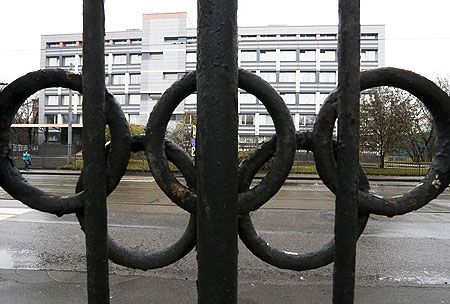The Moscow laboratory tasked with catching drugs cheats in Russian athletics shared a building complex with the doctor accused of masterminding the cheating scheme.
 A report commissioned by the World Anti-Doping Agency (WADA) exposed a state-sponsored drugs culture in Russian athletics, a scandal which could cost Russia its place at next year's Rio Olympics.
A report commissioned by the World Anti-Doping Agency (WADA) exposed a state-sponsored drugs culture in Russian athletics, a scandal which could cost Russia its place at next year's Rio Olympics.
- Russia faces ban from athletics for widespread doping offences
- Kremlin terms doping allegations against Russian athletes 'groundless'
- Key points from WADA's damning report against Russian athletics
WADA identified Doctor Sergei Portugalov, former deputy director of the Russian Federal Research Centre of Physical Culture and Sports (VNIIFK), as the mastermind of the scheme, advising athletes on doping, administering injections and helping cover up positive drugs tests.
"Despite his ostensibly legitimate status, Dr. Portugalov's activities indicate that he played a much more sinister role in the preparation of athletes," it said.
One of the people whose job was to detect and stop Portugalov's activities was Grigory Rodchenkov, the director of Russia's leading anti-doping centre which was accredited by WADA to test blood and urine samples for banned substances.
But in fact the two men and the agencies where they worked had a closely intertwined relationship.
At number 10 Elizavetinsky lane in eastern Moscow, Rodchenkov's laboratory stands next to the VNIIFK head office. Both buildings list the same address on their websites and are connected by an overhead walkway spanning the short space between them.
The anti-doping centre was opened in the run-up to Russia's 2014 Sochi Olympic Games, equipped with state of the art equipment and able to process around 20,000 tests a year.
Its entrance is flanked by tarpaulin fence covers showing silhouetted athletes competing at sports associated with Russian sporting achievements: ice hockey, figure skating and biathlon.
A review of publicly available Moscow city records shows the VNIIFK acted as a developer to build the new laboratory and a sports ministry statement announcing the anti-doping centre's opening suggests the government viewed the two organisations as the same entity.
Portugalov and Rodchenkov appeared at multiple conferences together, sitting on discussion panels and once attended a meeting of leading athletics trainers and specialists hosted by the VNIIFK.
A photograph from 2007 shows both men viewing a piece of testing equipment at an International Association of Athletics Federations seminar attended by former Russian athletics chief Valentin Balakhnichev, who denies WADA allegations of conspiring to blackmail athletes ahead of the 2012 London Olympics.
A person answering the phone at the VNIIFK told Reuters on Tuesday that Portugalov no longer works at the centre but declined to comment on why or when he left.
However, a statement on the VNIIFK website detailing the editorial board of its Journal of Sports Science publication lists Portugalov as the centre's deputy director as recently as August this year as.
Portugalov declined to be interviewed and the VNIIFK did not respond to written questions submitted by Reuters.
Russian Sports Minister Vitaly Mutko said on Tuesday Rodchenkov had resigned and his laboratory was closed following the WADA allegations that he had taken payments and destroyed samples to conceal positive test results.
A security guard at the centre on Wednesday said it was still open and Rodchenkov was at meetings at the sports ministry.
Rodchenkov and the anti-doping centre could not be reached for comment.
Image: A view shows a building, which houses a laboratory accredited by WADA, in Moscow
Photograph: Sergei Karpukhin/Reuters







